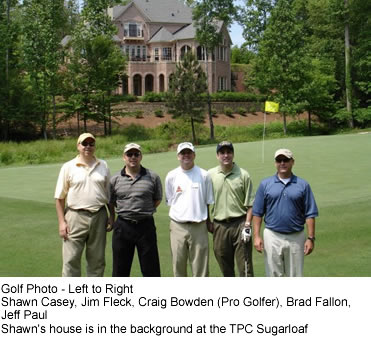
Shawn Casey of Mining Gold Corporation is an information marketer who has been around almost longer than information marketing. He does $15M – $18M per year out of his house in Georgia with no team – just his brother and sister. One of the most interesting parts of the interview was when Shawn talked about how to test, manage and get the maximum dollar per lead from call center partners.
Full Interview Audio and Transcript
Personal Info
Hobbies and Interests: Golf, Golf and Golf, Travel.
Favourite Sports Teams: Atlanta Falcons, Atlanta Braves, University of Georgia Bulldogs (football).
Favourite Books:
- Super Crunchers: Why Thinking-by-Numbers Is the New Way to Be Smart by Ian Ayres
- Blueprint to a Billion: 7 Essentials to Achieve Exponential Growth by David G. Thomson
Company Website: http://www.goldwares.com
Fast Track Interview
Adrian Bye: Today, I’m talking with Shawn Casey from Mining Gold Corporation. Shawn is an information marketer who helps teach people how to make money using the Internet. Shawn, tell us a little bit about who you are and what you’ve been up to.
Shawn Casey: I started in information marketing in the pre-Internet days. I was practicing law that focused on real estate and small businesses when I started to look at what else I could do. I started teaching seminars on Tax Planning and Asset Protection. I then developed home-study courses on the same subjects and started speaking at conferences around the country with a lot of real estate speakers.
In 1995, I left Pittsburgh where I was practicing law, and went to Jacksonville, Florida, to become the CEO of a company called Success Development International, which was big in real estate and business seminars. We did everything from direct mail to radio and television infomercials. We also did a lot of conferences. In 1999, our company had really grown, but I was on the road all the time and knew something had to change. That same year, I left that company primarily to figure out the Internet.
Adrian Bye: Did you realize in 1999 that the Internet was a direct marketing medium?
Shawn Casey: Yes. Because I had a direct marketing background, I looked at the Internet and said, “Here’s this great direct marketing medium. You can test things. You can do it small. You can track everything. If something works, you can roll it out bigger.” That was really before the advent of much more sophisticated tracking and advertising mechanisms.
My basic online start was driving traffic and generating leads for people that were receiving venture capital money and buying leads. We actually had a top 1000 property at the time in terms of traffic, which I didn’t even know. We received a call from a university researcher who wanted to do an interview. He said that the site we owned at the time, milliondollardrawing.com, was ranked at 780 in the world.
 When I started online, it took me longer to figure out the Internet because I couldn’t find a lot of good education resources about it. That was really frustrating because I thought I could just buy my way with education. As a result, I decided to write a book called Mining Gold on the Internet. It is about low cost and easy or free ways to generate traffic online. This is the first book we really started selling online as an info-product.
When I started online, it took me longer to figure out the Internet because I couldn’t find a lot of good education resources about it. That was really frustrating because I thought I could just buy my way with education. As a result, I decided to write a book called Mining Gold on the Internet. It is about low cost and easy or free ways to generate traffic online. This is the first book we really started selling online as an info-product.
Adrian Bye: How were you driving traffic to your top1000 site?
Shawn Casey: Primarily, we were buying traffic on Commission Junction. At the time, it was 25 cents a lead to the publisher. They were charging 20 percent markup, so we were paying them 30 cents. Everyday, they’d send us 2,000 or 3,000 leads. Our goal was really simple. We just measured everything in pennies. At the end of the day, can we take 30 cents and make 45 or 50 cents on it and have some new people on an e-mail list? That was our model, and that worked very well.
Some of the people driving a lot of traffic to us approached us directly. We made a lot of different deals and traded promotions with some other people in the sweepstakes business.
What really changed that model for us was when Commission Junction switched from a minimum 25 cents a publisher to one dollar. Our math didn’t work with a dollar. We still had some SEO traffic, but we just let that business fade away. I had been building the info-product arm anyway because the sweepstakes site pretty much ran on autopilot.
Adrian Bye: Today, you’re a pretty well-known information marketer. You’re helping people learn how to make money on the Internet. How does it all work?
Shawn Casey: We generate leads through people opting in for free information on one of our sites. We then enter them in our system and start trying to sell to them. We also run direct sale offers. Our core is not only to obtain buyers but also capture e-mail addresses. Our business opportunity seekers are really valuable to us because they tend to keep buying as a generic group.
At the time we get them in our system, our goal is to sell small products whether it’s a $27 or $47 item. From there, we continue to try to sell them a lower price product that they’ll consume. That product might be ours or something available from other people we know who are not in the CPA networks. We’ve also done launches either individually or with partners.
Tellman Knudson and I are going to do a very big promotion on our site, Listbuilding.com. We’re building a portal to train people on how to build a list for free and show them the basic ways you can make money from that list. They’re going to receive case studies on exactly what to do and how to do it.
Then we will launch and sell an advanced training course on how to turn your list into real money. We have a very high-level crew to teach this advanced course. Our A-list of people includes Jeff Walker, Frank Kern, Eben Pagan, who is known as David DeAngelo, and Patrick Coffey. We’ll have 12 weeks worth of training.
Adrian Bye: How often do you mail your list?
Shawn Casey: We mail it pretty much everyday.
Adrian Bye: What kind of volume of leads do you bring in per day?
Shawn Casey: We’re bringing in probably 3,000 to 4,000 leads a day. Including all telemarketing sales revenue, my business is probably doing between $15 to 18 million this year. I work out of my house and have two employees, which are my brother and my sister. We work hard at what we know works in terms of managing our list and creating a lot of buyers of low-ticket and very high-ticket products.
Adrian Bye: When a lead comes in, are they automatically signed up into a continuity program?
 Shawn Casey: As soon as they become a $27 buyer, they get one month free of our $39.99 a month continuity program. All the buyers go into our outsource telemarketing floor where they get sold on the back-end with coaching, courses, or something to help them achieve their goals faster. On top of that, we continue to offer them different products and services, whether it’s somebody else’s product launch, our tele-seminar, or different low-priced tools and services that can help them. It is pretty much a typical biz-op model.
Shawn Casey: As soon as they become a $27 buyer, they get one month free of our $39.99 a month continuity program. All the buyers go into our outsource telemarketing floor where they get sold on the back-end with coaching, courses, or something to help them achieve their goals faster. On top of that, we continue to offer them different products and services, whether it’s somebody else’s product launch, our tele-seminar, or different low-priced tools and services that can help them. It is pretty much a typical biz-op model.
A big part of our goal is not to get caught in the Internet marketing incestuous trap. We’ve built our Listbuilding.com launch to be an evergreen product. Next year, we can come back and still be generating leads and building our people who are learning how to build a list to make money. Then we will put them in the training class next year.
We’re making sure the system is set up to generate new leads through Listbuilding.com and the traffic we’ll drive there. We’re also setting up this product to bridge the gap outside of the Internet marketing world. A lot of people we’re talking to in the regular business world have small business clients who have no idea what to do with Internet or e-mail marketing. Through our product, we’re looking to share with these small businesses that a whole other world is out there.
If small business owners have already done the hard part of creating bricks and mortar and a customer stream, our add-on marketing information is going to be like easy money. For example, for the small business owner, just imagine if you could reach out and touch those people at the push of a button and have customer specials, instant sales, touch base with them, and send a newsletter so the customer knows you’re alive when they want to buy something again.
Adrian Bye: How big is your list now?
Shawn Casey: My list is just north of a million people who are all business-opportunity seekers.
Adrian Bye: What’s interesting to me is that you’re building your list fairly aggressively, but you’re also mailing your list pretty aggressively. What kind of relationship do you actually have with your list? Do people look up to Shawn Casey and say, “Man, that guy is the king,” or is it, “Here’s another e-mail from Shawn with something else for me to buy”?
Shawn Casey: It’s really somewhere in the middle. We do screen what we send and try to make sure that the offers are straightforward, legitimate, and that no one’s going to be surprised with buying something that is just horrendous.
It’s interesting when you have a very passionate or interested target market. Even though they know they’re getting a lot of e-mails from me and that most of those e-mails are selling something, they’re still on the list. It’s a question of finding things that fit within the interest level and value for that list.
Adrian Bye: Do you want to talk about your franchise company?
Shawn Casey: It is a completely different for us. Jeff Paul, Jim Fleck, and I have done a lot of business together in the last few years. We decided about 18 months ago to build a franchise company called eSpider Squad. What we’re doing is training franchisees to be Internet marketing consultants for local businesses. Our Internet marketing consultant would find a local business that either has or needs a Web site. Then the consultant would help the business get their Web site online or fix their existing site. Most Web sites are not really created for capturing leads or turning visitors into buyers. Because we come from the marketing side, we look at all this. If you’re going to build a Web site, it ought to actually do something functional like get traffic. If it gets traffic, it should turn that traffic into buyers.
We’re training our people to not only help businesses to get online with the Web site but to be able to do things such as search engine optimization, Pay Per Click, and ads. These are things we would consider to be normal. Interestingly enough, Experian did a business survey last year. They found that out of the 25 million small businesses in America, only four million had dedicated Web sites of their own. It’s an astounding number when you’re on the Internet side.
We have seven franchisees that we sold at the end of last year. We’re just really starting to lead-generate into the system. Besides the franchise and marketing systems we have for franchisees, we do all of the technical work. Once they bring in a client, they tell us what the Web site needs to look like, and we get that built. We also do the SEO, the Pay Per Click, ad management, and the hosting. All the franchisee has to focus on is marketing and sales.
Adrian Bye: Do you want to turn it into a billion-dollar business?
 Shawn Casey: We think it could be a very huge business because this business has a back-end residual. Once you create a client, you have a hosting account; you probably have an autoresponder account. If they’re smart, they’re letting you manage some kind of promotional campaign on a regular basis to drive traffic. We could see small business owners getting very interested in all this.
Shawn Casey: We think it could be a very huge business because this business has a back-end residual. Once you create a client, you have a hosting account; you probably have an autoresponder account. If they’re smart, they’re letting you manage some kind of promotional campaign on a regular basis to drive traffic. We could see small business owners getting very interested in all this.
Adrian Bye: You’ve been working with Prosper Learning, which is a very well-thought of company. What’s your thought on testing and managing phone rooms and knowing you’re doing maximum value per lead?
Shawn Casey: Even before I was on the Internet, we were dealing with a lot of telemarketing both inside and outside of our company. How do you know that they’re doing the best job they can? Part of that is a question of trust and how well you know the people with whom you’re dealing.
My first suggestion is that bigger companies are better, generally speaking, than smaller companies. If you’re dealing with a smaller company, a lot of checks and balances are not usually done. For example, the guy making a sale today so he can get paid tomorrow to feed his family next week is dangerous to have on the telephone. They’ll say anything, break all the rules and laws, and cause all kinds of trouble.
All of the good floors have a compliance department. If it’s done right, the sales people are never allowed in the door of the compliance department. The job of that department is to talk to the new customer and find out if anything was promised that shouldn’t have been and what got done.
In a lot of the smaller shops, compliance is the guy who owns the company. He may be calling to make sure he can actually get the check or the credit card cleared more than making sure that the rules were followed. It’s been my experience with the smaller companies that you’re running a risk of big problems coming back at you.
With Prosper, we have a built in reserve fund for refunds because we know they’re going to come. Whether they are owed a refund or whether we did our job or not, you end up refunding people simply to keep your complaint levels down both with your credit card companies and the legal authorities. If you’re dealing with a small company, that is literally surviving week to week, then you have a problem. If a bunch of people want their money back and those guys don’t have it or decide they’re not going to return it, you’re going to be at risk.
Part of our level of measuring complaints is that we have our own customer service department. We know when and why we have upset customers because they know how to directly get in touch with us by phone or e-mail when they’re not happy.
We want to maximize our revenue, but at the same time we also want to deliver value to the consumer. If they are not left with a positive feeling after a phone conversation, we want to make sure they are at least not left with a negative feeling. If we can continue to work with the consumer, a good chance exists that they’re going to buy something else from us down the road.










